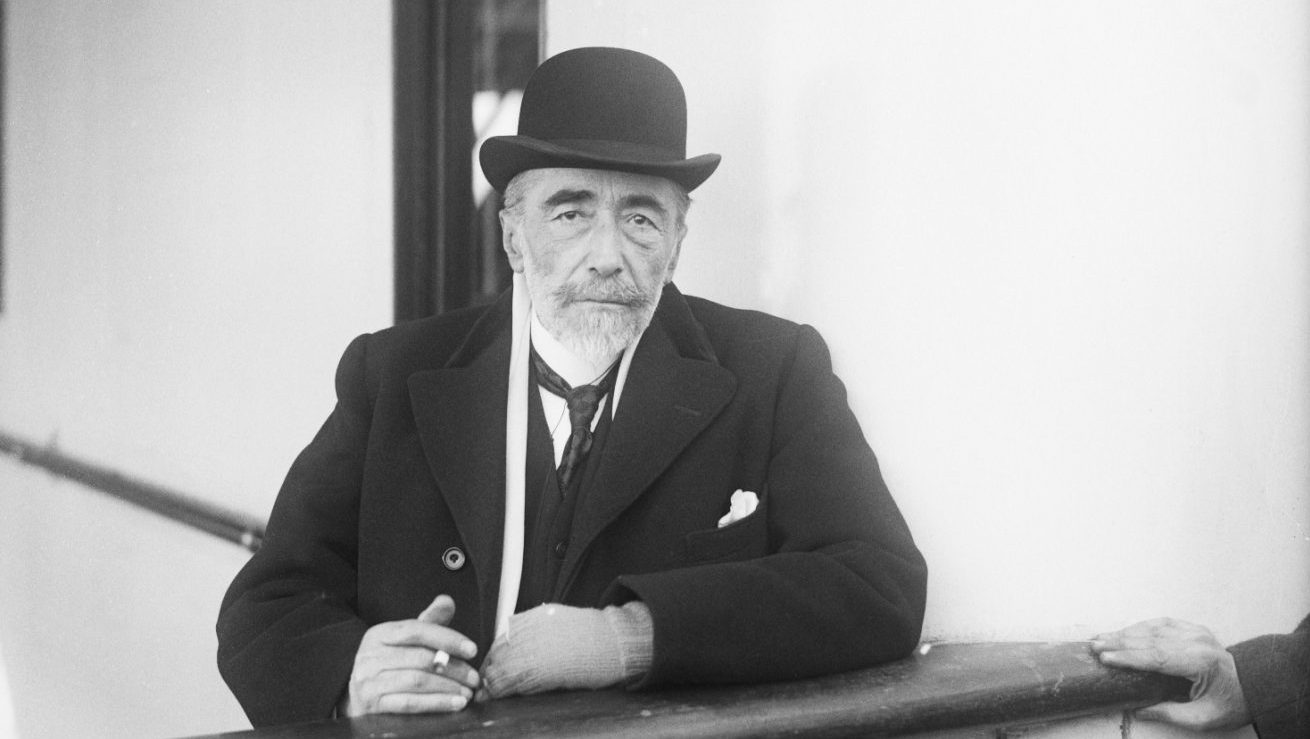In May 1923, Joseph Conrad arrived in New York for the first time and found himself besieged by the press before he was even able to disembark. Seated in the captain’s lounge of the liner Tuscania, the frail 65-year-old, who had little more than a year to live, answered a barrage of reporters’ questions as thoughtfully as he could.
Asked which book he considered his best, Conrad adjusted his monocle and said: “It depends on the day. Books are like one’s children, they are the children of the mind, so it is difficult to express any difference in one’s affection for them”.
The next morning, several newspapers reported Conrad’s favourite of his own novels to be It Depends on the Day.
During his grilling by the sensational end of the American press, Conrad may have reflected on how this new, rapacious mass media was the product of just the kind of globalism he had spent his authorial career documenting. In two decades as a merchant seaman visiting parts of the world ravaged by colonialism and naked capitalism, Conrad had seen first-hand the greed-inspired rot at the heart of what the world’s great powers declared to be civilisation. Here, right in front of him, was its offspring, newspapers obsessed with celebrity clamouring not for truth, merely the most sensational headline.
Being Joseph Conrad was never easy. From his earliest years, he’d seen some of the worst of humanity, forcing him to wrestle constantly with ethics and morality on the grandest dialectical scale while condemned by his circumstances to be the perpetual outsider.
Even the trade that brought him global fame left Conrad unfulfilled. On that bewildering afternoon aboard the Tuscania, the author of Heart of Darkness, Lord Jim and The Secret Agent answered a question on the quality of American writers by concluding: “I do not like writing. It is a frightful grind”.
A grind it may have been, an eight-hour writing day sometimes producing barely three sentences, but few writers have been able to distil the world’s most complex themes and turn them into absorbing fiction as well as Conrad. Imperialism, democracy, revolution, immigration: in Conrad’s hands they produced gripping stories in rich yet concise prose: Heart of Darkness, arguably his deepest and most complex novel, runs to barely 40,000 words.
The “frightful grind” was frequently in vain, too, sometimes self-inflicted – a commissioned short story for much-needed income expanding to novel length. Often it was just sheer ill-fortune: standing up after completing one story to a tight deadline, he knocked over an oil lamp and burned his work to nothing. Having agreed to sell a manuscript to a wealthy American collector, the item was dispatched across the Atlantic – on the Titanic.
It was almost as if he was born frowning. His father, Apollo Korzeniowski, was from an aristocratic Polish family – an anti-Russian nationalist to the point of obsession – who marked the birth of his son Józef Teodor Konrad Korzeniowski in what’s now Berdychiv, northern Ukraine, with a poem called To My Son, Born in the 85th Year of Muscovite Oppression.
“Baby son,” it began, “tell yourself you are without land, without love, without country, without people while Poland – your mother – is in her grave.”
By Conrad’s fourth birthday, Apollo’s relentless anti-Russian agitation had exiled the family to a region north of Moscow renowned for its disease-ridden swamps. Within three years his mother was dead from consumption; Apollo followed when Conrad was 11, cementing a melancholic loneliness that would never leave him.
The only place he ever felt close to belonging was the sea. From an early age, inspired by translations of James Fenimore Cooper and Captain Marryat, Conrad was determined to become a seaman and travelled to Marseille at 16 to join any ship that would have him.
He settled in England after coming ashore at Lowestoft in 1878, learned English from reading newspapers in the sailors’ reading rooms and rose to the rank of master mariner in the British merchant marine during a career that would inspire some of the greatest fiction in English – Conrad’s third language behind Polish and French.
In 1890 he was contracted by a Belgian company to spend three years taking steamships up and down the Congo River, but on his earliest voyages he saw how European boasts of civilisation and advancement were just empty rhetoric disguising a system thriving on shocking violence and ruthless oppression. “Everything here is repellent to me,” he wrote. “Men and things, but men above all.”
He resigned the commission soon after his first voyage and would later channel the experience into Heart of Darkness, exposing the hypocrisy behind the colonial project. He gave up his maritime career soon afterwards and in his mid-30s took up the pen in earnest.
Even as a seaman, Conrad was out of his time, learning his trade during the last days of sail and never fully embracing the age of steam. The firing of boilers and thunder of pistons, he wrote, “has not the same quality of intimacy with nature” and “lacked the artistic quality of a single-handed struggle with something much greater than yourself”.
This love of the sea never left him. His sons recalled Conrad’s continued everyday use of seafaring terms and how during a family holiday to Deal in Kent in 1920, their sickly, 62-year-old father visibly regained his youth among the town’s seafarers. He could still identify individual lightships in the Channel by the pattern of their lights and when he recognised an old crewmate from more than three decades earlier renting out pleasure boats on the front, it led to an excursion to one of those same lightships.
“It was quite extraordinary,” wrote his son John. “Here was a man who had not been to sea for more than 20 years, frequently crippled in hands and feet by gout, scrambling about a rolling lightship as though it was his everyday occupation.”
For all the horrors to which it had borne him, the sea was where Conrad came closest to fulfilment. Bertrand Russell observed on meeting the author in 1913 that “nothing in his demeanour in any way suggested the sea. He was an aristocratic Polish gentleman to his fingertips. His feeling for the sea, and for England, was one of romantic love – love from a certain distance, sufficient to leave the romance untarnished”.
He spent his life wrestling with great questions of empire and colony, dislocation and displacement and whether man could ever truly be good, but it was at sea where Conrad came closest to hearing answers whispered to him on the breeze.
There was one moment on the Tuscania when the shouting journalists and popping photographers’ bulbs faded into the background. Through a window, Conrad caught sight of a schooner gliding silently towards the Hudson River with a cargo of lumber, its sails illuminated in a shaft of late afternoon sunshine.
“Look at that,” he said softly, half to the gathered throng, half to himself, “I have been watching her all morning. Beautiful. Beautiful.”




